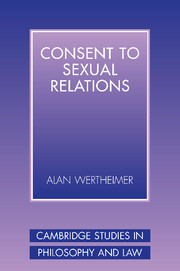Book contents
- Frontmatter
- Contents
- Preface
- Acknowledgments
- Abbreviations
- 1 Introduction
- 2 Law
- 3 The psychology of sex
- 4 The psychology of perpetrators
- 5 The harm and wrong of rape
- 6 The value of consent
- 7 The ontology of consent
- 8 Coercion
- 9 Deception
- 10 Competence
- 11 Intoxication
- 12 Sex and justice
- Appendix: Alphabetical list of hypothetical cases
- Index
11 - Intoxication
Published online by Cambridge University Press: 04 March 2010
- Frontmatter
- Contents
- Preface
- Acknowledgments
- Abbreviations
- 1 Introduction
- 2 Law
- 3 The psychology of sex
- 4 The psychology of perpetrators
- 5 The harm and wrong of rape
- 6 The value of consent
- 7 The ontology of consent
- 8 Coercion
- 9 Deception
- 10 Competence
- 11 Intoxication
- 12 Sex and justice
- Appendix: Alphabetical list of hypothetical cases
- Index
Summary
In this chapter I pursue a different issue of competence: is it permissible for a male to have sexual relations with a woman who unambiguously tokens consent while voluntarily intoxicated? The issue is not without its practical importance. The consumption of drugs and alcohol is implicated in many cases of “date rape.” Although there is nothing approaching a token of consent in many such cases, others involve what I call intoxicated consent and raise the question as to how PVC would regard such consent.
To facilitate the analysis, I distinguish between five claims. First, it may be argued that B's intoxicated consent does not render it permissible for A to have sexual relations with B even if B's intoxication is self-induced. Call this the impermissibility claim. On my stipulative definition, the impermissibility claim represents our all-things-considered judgment about the content of the principles of valid consent with respect to intoxicated consent. Second, it may be argued that if a woman tokens consent while she is intoxicated, her consent is necessarily invalid because intoxication undermines the capacity requirements of valid consent. On this view, intoxication entails invalidity (and impermissibility). Call this the intoxication claim. Third, it may be argued that if B's intoxication is itself voluntary or self-induced, then we should treat B as responsible for her intoxicated behavior. Call this the responsibility claim. By itself, the responsibility claim says little about the validity of B's consent. It is a general claim about one's responsibility for one's intoxicated behavior.
- Type
- Chapter
- Information
- Consent to Sexual Relations , pp. 232 - 257Publisher: Cambridge University PressPrint publication year: 2003

